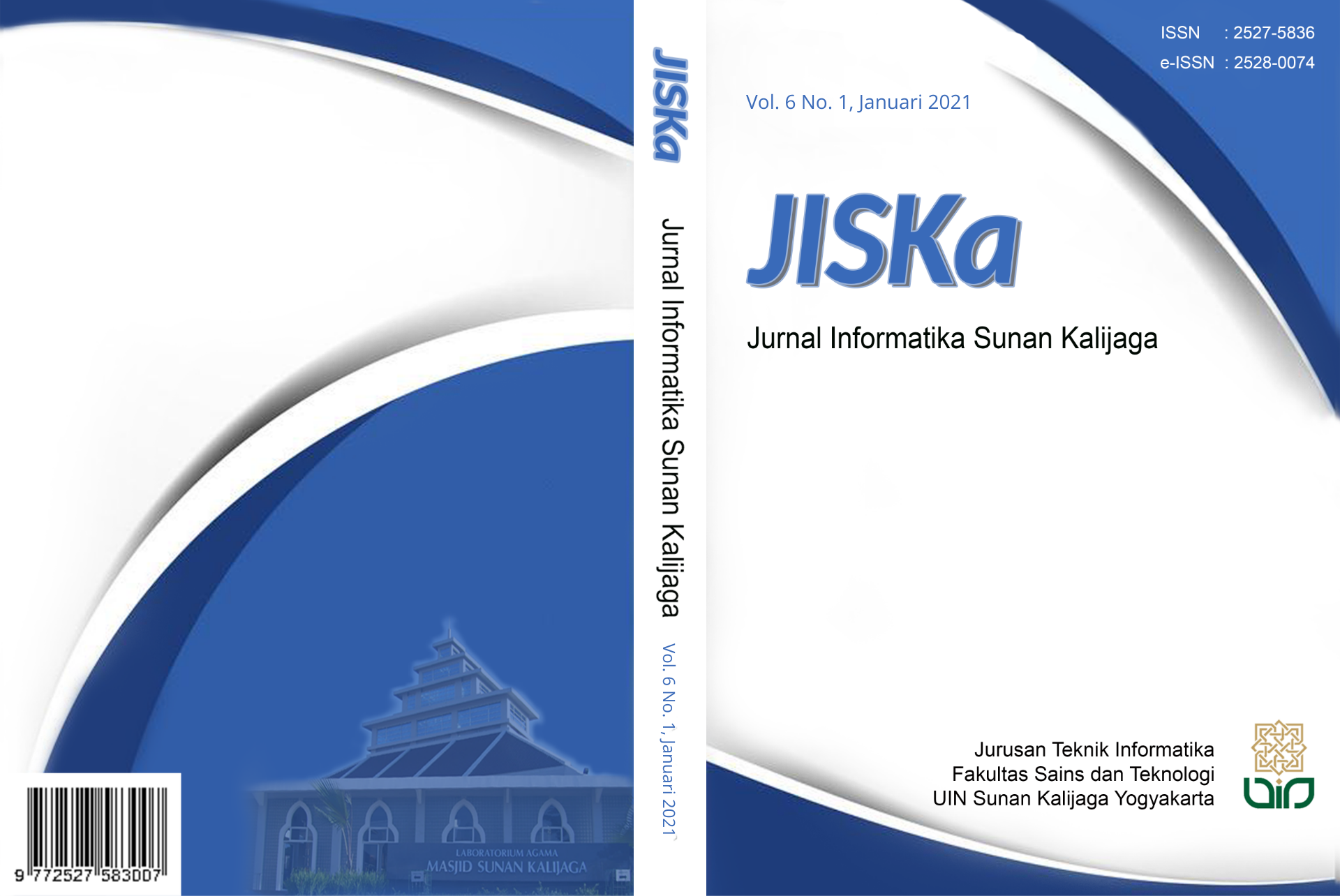Perbandingan Model Logistic Regression dan Artificial Neural Network pada Prediksi Pembatalan Hotel
DOI:
https://doi.org/10.14421/jiska.2021.61-04Abstract
Prediction for canceled booking hotels is an important part of hotel revenue management systems in the modern era. Because the predicted result can be used for the optimization of hotel performance. The application of machine learning will be very helpful for predicting canceled booking hotels because machine learning can process complex data. In this research, the proposed methods are Artificial Neural Network (ANN) and Logistic Regression. Later it will be done five times experiments with hyperparameter tuning to see which method is the most optimal to do prediction canceled booking hotel. From five times experiments, experiments number five (logistic regression with GridSearchCV) is the most optimal for predicting canceled booking hotels, with 79.77% accuracy, 85.86% precision, and 55.07% recall.
References
Antonio, N., Almeida, A. de, & Nunes, L. (2017). Predicting Hotel Booking Cancellation to Decrease Uncertainty and Increase Revenue. Tourism & Management Studies, 13(2), 25–39. https://doi.org/10.18089/tms.2017.13203
Antonio, N., de Almeida, A., & Nunes, L. (2019). Hotel booking demand datasets. Data in Brief, 22, 41–49. https://doi.org/10.1016/j.dib.2018.11.126
Bishop, C. M. (1995). Neural Networks for Pattern Recognition. Oxford University Press.
Bre, F., Gimenez, J. M., & Fachinotti, V. D. (2018). Prediction of wind pressure coefficients on building surfaces using artificial neural networks. Energy and Buildings, 158, 1429–1441. https://doi.org/10.1016/j.enbuild.2017.11.045
Chiang, W.-C., Chen, J. C. H., & Xu, X. (2007). An overview of research on revenue management: current issues and future research. International Journal of Revenue Management (IJRM), 1(1), 97–128.
Dunne, R. A. (2007). A Statistical Approach to Neural Networks for Pattern Recognition. Wiley-Interscience. https://doi.org/10.1002/9780470148150
El_Jerjawi, N. S., & Abu-Naser, S. S. (2018). Diabetes Prediction Using Artificial Neural Network. International Journal of Advanced Science and Technology, 121, 55–64. https://doi.org/10.14257/ijast.2018.121.05
Fujii, A., Tanaka, M., Yabushita, H., Mori, T., & Odashima, T. (2015). Detection of localization failure using logistic regression. 2015 IEEE/RSJ International Conference on Intelligent Robots and Systems (IROS), 4313–4318. https://doi.org/10.1109/IROS.2015.7353988
Lee, M. (2018). Modeling and forecasting hotel room demand based on advance booking information. Tourism Management, 66, 62–71. https://doi.org/10.1016/j.tourman.2017.11.004
Rajopadhye, M., Ben Ghalia, M., Wang, P. P., Baker, T., & Eister, C. V. (2001). Forecasting uncertain hotel room demand. Information Sciences, 132(1–4), 1–11. https://doi.org/10.1016/S0020-0255(00)00082-7
Ran, J., Zhang, G., Zheng, T., & Wang, W. (2018). Logistic Regression Analysis on Learning Behavior and Learning Effect Based on SPOC Data. 2018 13th International Conference on Computer Science & Education (ICCSE), 1–5. https://doi.org/10.1109/ICCSE.2018.8468834
Rushin, G., Stancil, C., Sun, M., Adams, S., & Beling, P. (2017). Horse race analysis in credit card fraud—deep learning, logistic regression, and Gradient Boosted Tree. 2017 Systems and Information Engineering Design Symposium (SIEDS), 117–121. https://doi.org/10.1109/SIEDS.2017.7937700
Santos, C. N. dos, Melnyk, I., & Padhi, I. (2018). Fighting Offensive Language on Social Media with Unsupervised Text Style Transfer. 56th Annual Meeting of the Association for Computational Linguistics, 2, 189–194. https://doi.org/10.18653/v1/p18-2031
Shamsaei, B., & Gao, C. (2016). Comparison of some machine learning and statistical algorithms for classification and prediction of human cancer type. 3rd IEEE EMBS International Conference on Biomedical and Health Informatics, BHI 2016, 296–299. https://doi.org/10.1109/BHI.2016.7455893
Strandberg, R., & Låås, J. (2019). A comparison between Neural networks, Lasso regularized Logistic regression, and Gradient boosted trees in modeling binary sales.
Vono, M., Dobigeon, N., & Chainais, P. (2018). Sparse Bayesian binary logistic regression using the split-and-augmented gibbs sampler. IEEE International Workshop on Machine Learning for Signal Processing, MLSP, 2018-Septe, 1–6. https://doi.org/10.1109/MLSP.2018.8516963
Wang, Y. H., Ou, Y., Deng, X. D., Zhao, L. R., & Zhang, C. Y. (2019). The Ship Collision Accidents Based on Logistic Regression and Big Data. Proceedings of the 31st Chinese Control and Decision Conference, CCDC 2019, 4438–4440. https://doi.org/10.1109/CCDC.2019.8832686
Weatherford, L. R., Kimes, S. E., & Scott, D. A. (2001). Forecasting for hotel revenue management: Testing aggregation against disaggregation. The Cornell Hotel and Restaurant Administration Quarterly, 42(4), 53–64. https://doi.org/https://doi.org/10.1016/S0010-8804(01)80045-8
Yang, B., Wang, M., Xu, Z., & Zhang, T. (2019). Streaming Algorithm for Big Data Logistic Regression. Proceedings - 2018 IEEE International Conference on Big Data, Big Data 2018, 2940–2950. https://doi.org/10.1109/BigData.2018.8622392
Yang, Z., & Li, D. (2019). Application of Logistic Regression with Filter in Data Classification. 2019 Chinese Control Conference (CCC), 3755–3759. https://doi.org/10.23919/ChiCC.2019.8865281
Zhang, Y. (2019). FORECASTING HOTEL DEMAND USING MACHINE LEARNING APPROACHES.
Zou, X., Hu, Y., Tian, Z., & Shen, K. (2019). Logistic Regression Model Optimization and Case Analysis. 2019 IEEE 7th International Conference on Computer Science and Network Technology (ICCSNT), 135–139. https://doi.org/10.1109/ICCSNT47585.2019.8962457
Downloads
Published
Issue
Section
License
Authors who publish with this journal agree to the following terms as stated in http://creativecommons.org/licenses/by-nc/4.0
a. Authors retain copyright and grant the journal right of first publication with the work simultaneously licensed under a Creative Commons Attribution License that allows others to share the work with an acknowledgement of the work's authorship and initial publication in this journal.
b. Authors are able to enter into separate, additional contractual arrangements for the non-exclusive distribution of the journal's published version of the work (e.g., post it to an institutional repository or publish it in a book), with an acknowledgement of its initial publication in this journal.
c. Authors are permitted and encouraged to post their work online (e.g., in institutional repositories or on their website) prior to and during the submission process, as it can lead to productive exchanges, as well as earlier and greater citation of published work.










